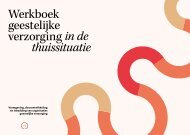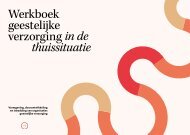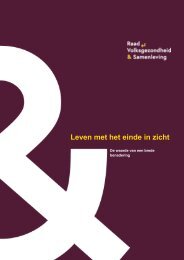Buiten kerk en moskee
Religie in een pluriforme samenleving. Diversiteit en verandering in beeld.
Religie in een pluriforme samenleving. Diversiteit en verandering in beeld.
You also want an ePaper? Increase the reach of your titles
YUMPU automatically turns print PDFs into web optimized ePapers that Google loves.
8 Concluding remarks on three reports<br />
8.1 Three reports<br />
We will <strong>en</strong>d this trilogy of reports by reviewing the ideological changes described in them.<br />
The two previous reports, which were published in 2018, were <strong>en</strong>titled The religious experi<strong>en</strong>ce<br />
of muslims in the netherlands. A focus on diversity and change (De religieuze beleving van moslims<br />
in Nederland. Diversiteit <strong>en</strong> verandering in beeld; Huijnk 2018) and Christians in the Netherlands:<br />
ecclesiastical participation and Christian faith (Kerkelijke deelname <strong>en</strong> christelijke gelovigheid; De Hart<br />
and Van Houweling<strong>en</strong> 2018). Our trilogy conc<strong>en</strong>trates on four population groups: Christian<br />
believers, Muslims, people with spiritual interests and non-believers (who do not believe in<br />
a religion or spiritual alternatives to a religion). The three reports focus on rec<strong>en</strong>t developm<strong>en</strong>ts<br />
in particular, against the background of long-term ideological developm<strong>en</strong>ts in the<br />
Netherlands.<br />
8.2 Placing the outcomes of this trilogy in the context of broader and longer-term<br />
developm<strong>en</strong>ts<br />
8.2.1 The erosion of Christianity in the Netherlands<br />
We will discuss several ideological developm<strong>en</strong>ts in this report, limiting our att<strong>en</strong>tion to<br />
the Netherlands and approximately the last 50 years. Christianity in the Netherlands eroded<br />
quickly. Betwe<strong>en</strong> 1970 and 2020, the Dutch population grew by approximately onethird.<br />
In the same 50-year period, the number of Dutch citiz<strong>en</strong>s who were part of a church<br />
community fell by approximately 4 million – a reduction of more than 40% – while all the<br />
growth churches together recorded a membership increase of less than 230,000. To put<br />
this into perspective: this is like losing the population of the eight biggest cities in our<br />
country and gaining just the resid<strong>en</strong>ts of D<strong>en</strong> Bosch and Haarlemmermeer. In short, although<br />
the situation is not the same for every church, surveys and the numbers provided<br />
by churches themselves lead to the conclusion that the Netherlands is a country that is<br />
secularising rapidly (De Hart and Van Houweling<strong>en</strong> 2018: 155 et seq.), ev<strong>en</strong> in comparison<br />
with other secularising European countries (Chapter 2). This developm<strong>en</strong>t has had an especially<br />
great impact on the Roman Catholic church in the last 50 years; the reorganisation,<br />
merger and closing of Catholic parishes are the order of the day.<br />
Surveys show that six in t<strong>en</strong> Dutch citiz<strong>en</strong>s have little trust in churches and religious organisations<br />
(a marked contrast with the great trust placed in sci<strong>en</strong>tific institutions). Threequarters<br />
of respond<strong>en</strong>ts now say they feel that churches are not able to answer the most<br />
important spiritual questions of the day. Three-quarters of respond<strong>en</strong>ts also say that the<br />
views of churches do not reflect their own life vision or only barely do so (De Hart and Van<br />
Houweling<strong>en</strong> 2018: 48 et seq.). In 2019, the Netherlands Institute for Social Research<br />
(Sociaal <strong>en</strong> Cultureel Planbureau, scp) published the results of the biggest ever socio-sci<strong>en</strong>tific<br />
research project on the Dutch id<strong>en</strong>tity to date, part of which involved a survey of 5,000 re-<br />
152 c o n c l u d i n g r e m a r k s o n t h r e e r e p o r t s










